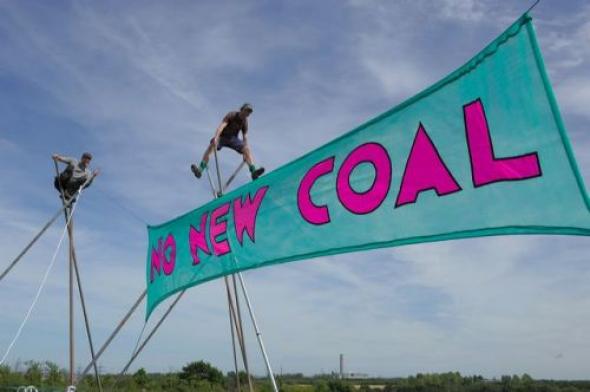A Climatic Disorder? Class, Coal and Climate Change
At last November's NUM convened conference, trade unionists and Climate Campers were invited to debate the explosive cocktail of (clean) coal, class and climate change. John Cunningham reports on the frustrating attempts to find a middle ground
Last year's camp at Kingsnorth in Kent against the opening of a new coal fired power station produced a range of predictable responses, from the inanity of the Guardian's suggestion that it was yet another alternative lifestyle festival, to the over zealous attentions of the security state. One of the more interesting responses was from long standing anarchist activist and ex-National Union of Mineworkers (NUM) official Dave Douglass. In a polemic against the camp, he addressed the anti-coal bias of the Climate Campers alongside a perceived lack of class analysis within the camp and the wider green movement. There is undoubtedly a feel good anti-capitalism implicit in much of the discourse around Climate Camp that can exclude any consideration of class in favour of blandly utopian sentiment. For instance, in the Climate Camp Newspaper, statements such as ‘Sometimes it feels as though our world is coloured in sadness, and you just want to be somewhere else', read less like a détournement of advertising copy than a self help approach to political activism, the ‘middle class voice' that Douglass characteristically claimed Climate Camp spoke in.1
At the time I was relieved that, against the fluffy anti-capitalism of much of the camp's official discourse, Douglass introduced the perspective of those who may not have ‘somewhere else' to go, locked into jobs and communities that a politics of exodus cannot easily address. The yearly anti-climate change roadshow attempts to offer a response to climate change that would destabilise business as usual, suggesting at least nominally anti-capitalist alternatives. However, its model of protest camp and sustainable community gleaned from the post-Seattle summit protests can seem too abstracted from everyday life to break the general perception that climate change exists ‘out there', to be dealt with by superheroes such as Al Gore. Its model of sustainability can also appear as a holiday in scarcity to the casual observer. The intervention by Douglass was a dose of messy actuality. The camp's response was to invite Douglass to address it, and he turned up with ex-NUM president, ‘Old King Coal' himself, Arthur Scargill in tow. The Newcastle based conference, Class, Climate Change and Clean Coal - the Climate Campers and the Unions, sponsored by the NUM, the RMT and the Industrial Workers of the World (IWW), arose out of this dialogue.
This is a sad and confusing conjuncture of forces.
Dave Douglass2
At least the intersection of labour and environmentalism in the Douglass/ NUM/ Climate Camp exchange punctured a certain spectacle of climate change: the accumulation of catastrophic images, millennial eco-fear and eco-friendly consumerism that can induce occasional dread and the desire to assume the crash position. The class tensions around Climate Camp seemed like a clash of cultures between a traditional ‘mass worker' form of trade unionism and a diffuse network of activists whose politics ranged from pale green reformism to red and black anti-capitalism. In fairness to Climate Camp, they ran workshops on class and emphasised a ‘just transition' in the official booklet's dialogue with workers in carbon-based industries. This is the notion that a transition can be made to a non-carbon based economy that does not penalise the poor or workers in carbon based industries such as coal miners. It is an argument for responses to climate change that place social justice at the forefront of any structural shift in the economy. While it is often posited as a decentralised, autonomous response, it can also be part of a social democratic state-led one, as Paul Chatterton's argument later in the conference for a ‘green new deal' was to make clear.
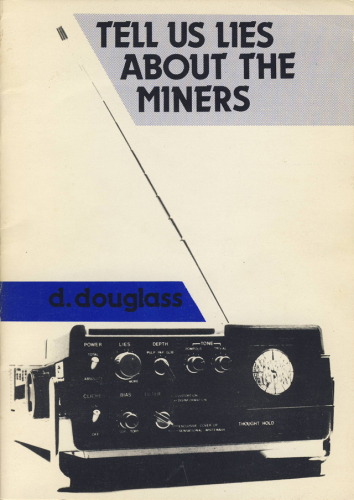
Image: Dave Douglass, Tell Us Lies About the Miners, 1985 (pamphlet cover)
While Douglass' intervention was welcome it also threatened to reduce a complex series of questions around class and climate change to the singular question of ‘more prole than thou'. There's an admirable tenacity to the perpetuation of proletarian culture in the face of defeat and expropriation: many of the current pit banners at the miners' Durham Big Meeting gala are from defunct pits, less postmodern nostalgia than an assertion of community. However, this can harden into a closed identity as can the activist milieu around Climate Camp, with its own cultural and discursive forms and marginal counter-cultures that mean little to those outside.
I hoped that the conference would reveal something in common beyond a shared preference for renewable energy and being anti-nuclear, points all the delegates made. The main point of contention in terms of energy policy was clean coal, based on carbon dioxide capture and storage, but the conjunction of more anti-capitalist elements from Climate Camp with the representatives of old school trade unionism also suggested other fault lines, both cultural and political.3
Following the great tradition of working class radicals, the meeting was held in the Bridge Hotel pub in Newcastle, close to the industrial grandeur of the Tyne bridge and adjacent to the contemporary bubble of regeneration, cultural capital and service driven consumerism that is Newcastle today. A combination of NUM veterans, miners, trade unionists, eco-punks, socialists and maybe even one or two members of the general public attended the meeting. The conference delegates - NUM spokesmen, Climate Campers and a lone RMT spokesman - occupied a low wooden podium. Seated three at a time behind a desk, they sometimes gave the impression of a quarrelsome Stalinist tribunal. After a brief introduction by Keith Whittaker of the NUM, Dave Douglass presented the keynote speech.
The Earth disnae give a bugger.
- Dave Douglass
Douglass came across as humorous, thoughtful and angry, equally at home in both NUM and Climate Camp circles. In comparison to the other miners delegates his presentation was discursive and wide ranging. He admitted the human impact on climate change, but emphasised its natural movement, believing that natural factors are more likely to wipe out humanity, or even asteroids from space. In this he was ducking the issue since the issue is not so much whether climate change is ‘natural' or ‘man made' as the effect of a particular social relation, capitalism, on the way humanity interacts with the environment.4
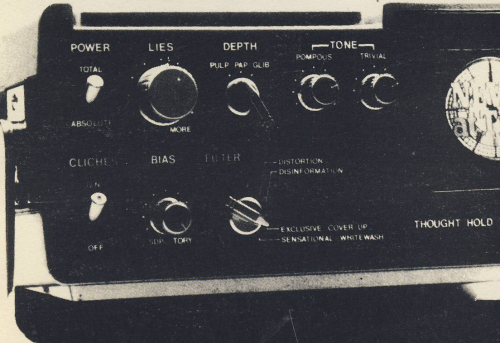
Image: Tell Us Lies About the Miners, (cover detail)
He was on stronger ground when he argued that there was a reification of climate change that came out of a green view of nature: ‘As a painted landscape pantomime at the Theatre Royal'. Nature, rather than being an abstraction, was always linked to the productive activity of humanity, the Earth as a ‘dead crust' rather than some Gaia like entity. For myself, viewing the earth as a ‘dead crust' ends up as much of a reification as environmentalist visions of Gaia. The productive activity that links humanity with nature is never simply exerted upon something inert - a ‘dead crust' is as much of an abstraction as Gaia, both remaining within the logic of capital. The necessity was to address climate change from the perspective of the poor and exploited. Capitalism was incapable of doing so, but some trade unions like the NUM and IWW had this perspective. Renewables were fine but not wind farms, partly because they desecrated open spaces. He called for fair trade coal as a way of both invigorating the UK coal industry and addressing exploitation abroad. Douglass also emphasised the running down of the UK mining industry for political reasons, accusing the green movement of complicity with this process.
Environmentalism and Climate Camp undoubtedly attract a lot of green mystical cretinism, but Douglass' ire was misdirected in terms of the environmentalists present, all being scrupulously materialist in their thinking on climate change. Stressing the natural cycle of climate change meant that Douglass actually made more of Nature than they did.
Douglass also introduced a topic that other NUM speakers emphasised: the industrial working class, in this case miners, have an inherent political perspective and class consciousness lacking in the service industries. It's certainly impossible to imagine mass pickets of Pret A Manger workers confronting cops, although that would be quite an event. But it's equally impossible to (re)posit the mass worker as the vanguard of class consciousness, since the conditions for that kind of organisation no longer exist in the UK. Context changes all, and it is sobering to realise that whereas 10,000 miners confronted cops at Orgreave in 1984, there are now around 5,000 miners in total. A workerist ideology introduces nostalgia rather than facing the reality of disseminated struggles against capitalism, out of which elements of Climate Camp arise.
Other NUM delegates were more narrowly focused upon clean coal as a technological solution to climate change, the continued viability of carbon-based industry and the future of mining communities. Scargill's presentation followed the oratorical model of old style trade unionism, with Arthur standing up and lots of gesticulation and pointing. Speaking loudly he could have been addressing the Durham Big Meeting. He made a well researched, belligerent case for the continued relevance of coal to energy policy, packing his speech with statistics and questioning the emphasis upon coal as a cause of global warming, a point echoed by other NUM speakers. Scargill went on for twice the 20 minutes allotted, in true leftist style, with everyone from the chairman onwards probably too overawed/exhausted to intervene. He left soon after.
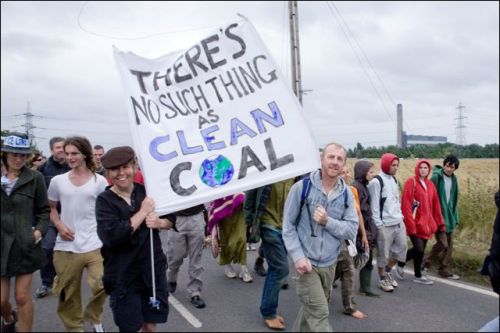
Image: Caravan at the gate of Kingsnorth, Climate Camp 08, Kent, 9 August 2008
All of the Climate Campers were at pains to emphasise that they were not hostile to mining communities and were aware of the intrinsic relationship between climate change, class exploitation and capitalism. They also all underlined that they were not ‘official' representatives of Climate Camp. This was undoubtedly one of the lines that separated the trade unionists from the Climate Campers, the union officials having a much more unproblematic relation to being a representative of the working class. The Climate Campers were definitely from the more anti-capitalist wing and it might have been interesting had someone from a more single-issue perspective been present. Paul Chatterton, activist and Leeds University academic, gave a well reasoned presentation about the need for a ‘just transition'. After underlining the importance of avoiding a climate change ‘tipping point' of a four degrees rise, he emphasised that environmentally based politics were ultimately against ‘mindless, ceaseless growth' in the form of neoliberal capitalism. ‘Just transition' would share out the costs of climate change equally, through a ‘green new deal', ecological Keynesianism creating a ‘green collar economy'. This would amount to the re-nationalisation of energy production and a rejection of the market.
I must admit that the concept of a ‘green new deal' makes me want to strangle the planet with a couple of spare plastic bags. It's the realist corollary to the utopian elements of Climate Camp, but such an uncritical acceptance of a social democratic solution ignores the problem that capitalist social relations would still remain in place. It would be compatible with the development of an authoritarian, biopolitical state, obsessed with the administration of life. It is quite easy to imagine a dystopian ‘green new deal' that continued the valorisation of capital alongside a work-ethic based morality all too conducive to the more sanctimonious elements of environmentalism. Chatterton did mention that a ‘green new deal' might lead to less work and more holidays, a rare acknowledgement that climate change might not necessitate new regimes of scarcity. There is in this a trace of what was missing in the conference, a sense of possibility not embedded in soft focus ‘somewhere else' utopianism but in an immanent engagement with capital's apparatus of capture. However, a ‘green new deal' is unlikely to deliver the kind of simultaneous refusal of scarcity and production that might begin to construct a genuine anti-capitalist response to the exigencies of climate change. It hardly amounts to a critique of wage labour.
Ian Lavery, President of the NUM, underlined the gulf between the NUM and Climate Campers through his refusal to engage with Paul Chatterton's case for ‘just transition'. Remarking dismissively that he was in the bar during Chatterton's talk, apparently what was needed was a ‘just transition' to clean coal. Throughout the conference the NUM's concentration upon clean coal raised questions about the contradiction of trade unions being not only a bureaucratic appendage to the marketing of labour but also a possible focal point for resistance and the reproduction of communities tied to a particular industry. Lavery's work ethic was committed to coal rather than a green collar economy. He left shortly afterwards in his big car to go to another meeting. Oh, the life of the full time official.
The focus on new technologies as a general fix for climate change always threatens to introduce a Hollywood blockbuster narrative: ‘And then there was clean coal...' While the viability of clean coal is in doubt, any present development of it is reliant upon capital being able to extract value from it.5 The same would go for the development of renewables. It is unlikely that an exclusive focus on technology can really challenge the relation between climate change and the reproduction of capitalism.
David Guy, President of the North East area of the NUM, made a restrained and dignified argument for the viability of the North East Coalfield and spoke with some melancholy of the effects of the post-1984 strike on what used to be the ‘left wing juggernaut' of the trade union movement. He pointed out that six months after the strike in 1985, and again in 1987, miners were back out on strike. A good reminder of how the memory of past struggle informs the present dilemma of the NUM, mining and ex-mining communities.
The next Climate Camper was Paul Morrozo, who made the connection between climate change and hurricane Katrina, pointing out that it was the precarious poor who suffered while the rich escaped, as demonstrated by the wholesale privatisation and gentrification of New Orleans. He also pointed out that climate change would put a squeeze on capitalism's attempts to avoid financial crisis and, I would add, its attempts to address climate change. More workers' control was essential to combat climate change. He was willing to countenance mining if carbon capture was developed as a transitional measure, but argued that it was still in an experimental phase; the state and E.on were both lying about Kingsnorth's potential for carbon capture. Ultimately, if resources continue to be extracted, ‘we're toast'.
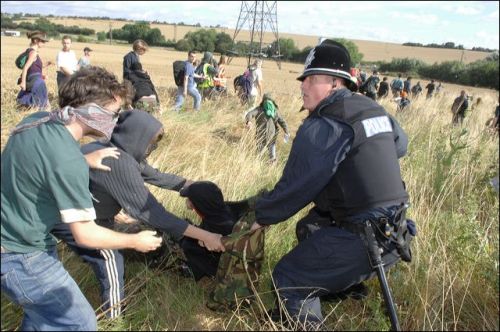
Image: Police chase environmental activists during the assault on Kingsnorth power station, Kent, 9 August 2008
Morrozo's contribution was constantly interrupted by the chairman, NUM official Dave Hopper, resplendent in both red shirt and red tie in case we didn't get the message. Hopper seemed to take great offence at any anti-coal argument, cutting in at one point with ‘Put one of those windmills on your head and walk around with it'. This might have been funny to him but most objected strongly, especially when he seemed to have a fit after being heckled by a woman. At this point he resigned to be replaced by Dave Douglass. This was one of the few points at which a residual animosity surfaced, the atmosphere generally being more constructive.
The RMT regional secretary Stan Herschel spoke on the influence of the road lobby and the confluence of interests in business that work against environmentally sustainable energy resources and the trade union movement. At this point, I must admit, my mind was drifting towards a pint and my own most sustainable way home.
The last speaker was Kevin Bland of Green Anarchism, who talked about the class nature of climate change as the poor carry the cost, a point NUM delegates had also made. He was against the continued mining of coal and questioned the environmental credentials of carbon capture. Open-cast mining was unacceptable and a form of revenge on mining communities. His description of the work done by local environmental groups against open-cast suggested to me a much more investigative and open process than much of the Climate Camp activists' grandstanding, since it involved the self-organisation of communities. Class emerged as less of an abstraction here than in other eco-activists' presentations. He was also surprisingly sympathetic to Douglass' class analysis of Climate Camp, describing many supporters as weekend hippies but stressed that many did not fit this description. There was a suggestion by an NUM delegate that the union might be prepared to pursue an anti-open-cast collaboration with environmentalists, as it had with ‘No Open-Cast' in the 1990s.6 There was also a lot of general debate between the various presentations, my favourite contribution being a sort of ode to coal as alchemical material by a retired miner, thanking it for the gift of class struggle.
The conference often threatened to become nothing but the conjunction of two forms of reformism - trade unionism and environmentalism - disputing the response to climate change rather than providing a challenge to the commodification of the world that both climate change and capital are predicated upon. Both trade unionists and activists discussed climate change and class as though they were only connected when the poor, or a particular segment of the working class, were victims of disaster or a shift in production, necessitating the intervention of a union or activist community.
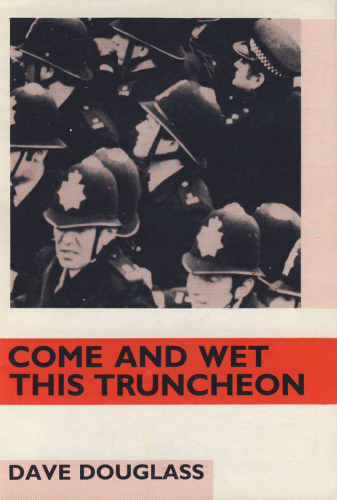
Image: Dave Douglass, Come and Wet this Truncheon, 1986 (pamphlet cover)
Beyond the stereotypes of pit helmets and dreadlocks the central question the conference raised for me is how to formulate a response to climate change capable of resisting capital's own one - given that capitalism loves a good catastrophe from which to extract value. Is there an inherent connection between capital, disaster and labour? In 1951, Italian ultra-leftist Amadeo Bordiga drew on Marx's concept of ‘dead labour' (past labour solidified in the infrastructure it has produced) to demonstrate why capitalism is ‘the masterful development of an economy based on disasters'.7 In his words, ‘To exploit living labour, capital must destroy dead labour which is still useful. Loving to suck young warm blood it kills corpses'.8
His point was that capital thrived on disaster because it provided the opportunity to extract more surplus value from living labour through production. Bordiga suggests in this the way that disaster, capital and labour are imbricated - class and labour rather than being factors to consider in the disaster of climate change are central to it. Climate change often seems to be the product of two inhuman agencies, nature and capitalism, but it's unlikely that a return to trade union forms of organisation, even ‘one big union', could produce the necessary oppositional force to counter this. Despite the tensions within the conference, I felt it was constructive in beginning to open a dialogue around this issue: what forms of class composition and organisation might arise within a climate change paradigm dominated by an increasingly authoritarian state and capital's need to prosper?
John Cunningham <coffeescience23 AT yahoo.co.uk> lives in London and is still looking for a way out
Info
The Labour Movement Conference ‘Class, Climate Change and Clean Coal - the Climate Campers and the Unions' was held at the Bridge Hotel in Newcastle Upon Tyne, 1 November 2008
Footnotes
1 Climate Camp Newspaper, August 2008. Copies can be obtained at, networking@climatecamp.org.uk
2 Dave Douglass, Climate Camp report, http://www.indymedia.org.uk/en/2008/08/407011.html
3 For more on carbon storage see, ‘Techno-Fixes: A critical guide to climate change technologies', Corporate Watch report, 2008, pp.35-39, http:// www.corporatewatch.org
4 Will Barnes, ‘Capital Climes', Mute, vol 2 #5, 2007, http://www.metamute.org/en/Capital-Climes
5 ‘Techno-Fixes', op. cit.
6 For details on this campaign see, Do Or Die, issue 7, pp.23-32, http://www.eco-action.org/dod/no7/23-32.html
7 Amadeo Bordiga, Murdering the Dead, Antagonism Press, 2000, p.31.
8 Ibid, p.36.
Mute Books Orders
For Mute Books distribution contact Anagram Books
contact@anagrambooks.com
For online purchases visit anagrambooks.com


